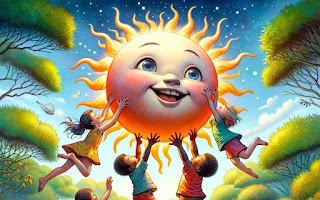Once some children, at their mother’s behest, very gently approached the sun’s armpit. As the sun lay sleeping. They went to lift up the sun’s armpit.
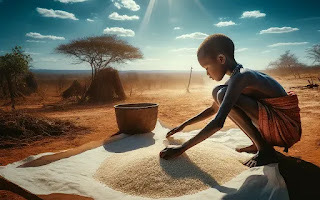
At the same time, another woman ordered her children to do the same thing. She told them that if they approached ever so gently and drew up the sun’s armpit, then the rice of the Bushmen would become dry, and the sun, as it proceeded from place across the sky, would cause everything to become bright. For this reason it was that the old woman, their mother, coaxed her children to do as she asked. “But, children,” she said, “you must wait for the sun, who is making us so cold, to lie down to sleep. Then approach him gently and, all together, lift him up and throw him into the sky.” Thus, indeed, did both of the old women speak.
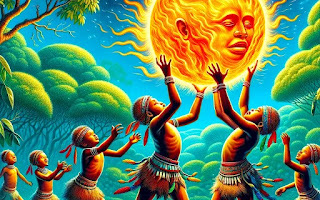
And so the children approached the sun. They first sat down and looked at him in order to determine whether, as he lay there, he was looking at them. Finally they saw him lying there very quietly, his elbow lifted up so that his armpit shone upon the ground. Before the children prepared to throw him up into the sky they remembered what the old woman, their mother, had said: “O children, going yonder, you must speak to him when you throw him up. You must tell him that he must be the sun – the sun who is hot and who, as he passes along the sky, causes the Bushmen rice to become dry – the sun who is hot as he stands above in the sky.”
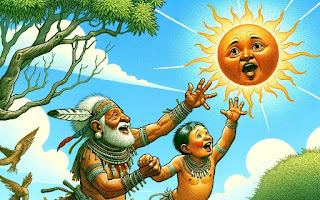
Thus had their mother, the old woman, whose head was white, spoken. They had listened and were going to obey her.
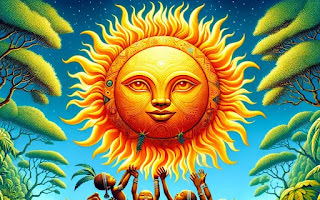
When all was in readiness, they took hold of the sun, all of them together, lifted him, raised him, even though he was hot to touch, and threw him up in the sky, addressing him as they threw him up: “O sun, you must altogether stand fast and you must proceed along your way – you must stand fast while you are hot.”
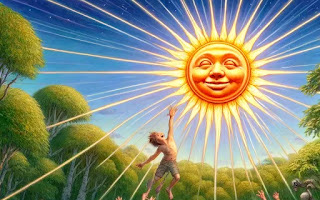
Then the children returned to their mother, and one of them went to her and said, “Our companion, who is here, this one, took hold of him. So did I. Then my younger brother and my still younger brother, they all took hold of him. ‘Grasp hold of him firmly,’ I said, ‘and throw him up. Grasp the old man firmly and throw him up.’ Thus I spoke to them. Then the children threw him up, the old man, the sun.”
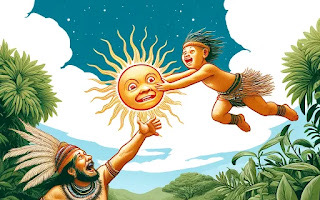
Then another one of those who had been resent – a younger indeed – he also spoke to her and said, “Oh, grandmother, we threw him up, the sun, and we told him what you had told us, that he should altogether become the sun, the sun who is hot, for us who are cold. And we addressed him thus: ‘O my grandfather, sun’s armpit! Remain there at that place. Because the sun who is hot so that the Bushmen rice may dry for us, so that you may make the whole earth light, that the earth may become warm in the summer, that you may altogether make heat. For the reason, you must shine everywhere. You must take away the darkness. You must come indeed so that the darkness will go away.'”
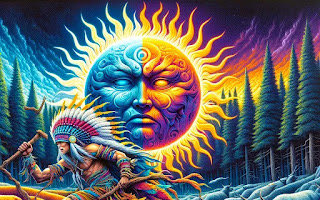
And thus it is. The sun comes, the darkness departs; the sun sets, the darkness comes and, then, at night the moon comes. The moon comes out; it brightens the darkness and the darkness then departs. It has taken the darkness aways and now it moves along, continually brightening the darkness. And the the moon sets and the sun, following, comes out. The sun now drives away the darkness, indeed drives away the moon as it stands there. The sun actually pierces the moon with his knife and that is why it decays. Therefore the moon said, “O sun! leave the backbone for the children!” And the sun did so.
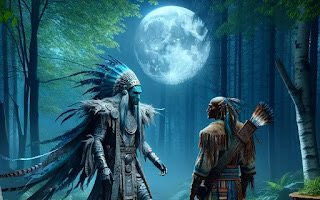
Then the moon painfully went away painfully returned home. He went home to become another, a moon which is whole. He again comes to life although is had seemed that he had died. He becomes a new moon and feels as though he had put on a new stomach. He becomes large; he is alive again. Then he goes along as night, feeling that he is the moon once more. Indeed he feels he is a shoe, the shoe that Mantis threw into the sky, and ordered to become the moon.
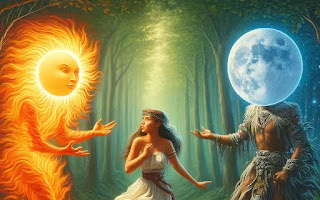
That is what the sun has done – made all the earth bright. And thus it is that the people walk while the earth is light. Then people can see the bushes, can we see other people. They can see the meat which they are eating. They can see the springbok, can hunt it in summer. It is when the sun shines, like wise, that they can hunt the ostrich. And so – because the sun brightens the earth, because he shines upon the path of men – the Bushmen steal up to the gemsbok, steal up to the kudu, travel about in summer, and go visiting one another. Because the sun shines hottest upon the path of men in summer, they always go shooting and hunting then, for they are certain to espy the springbok. It is in the summer that they lie contented in their little homes made of bushes, and they scratch up the earth. All day they do when the springbok comes.
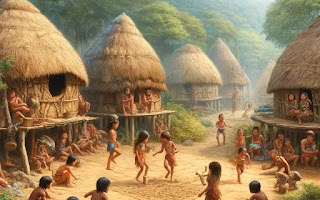
The people of whom we speaking were the Bushmen, the men of the early race. It is they who first inhabited this earth and it was their children who worked with the sun, who threw the sun up and made him ascend so that he might warm the earth for them, and that they might be able to sit in the sun.
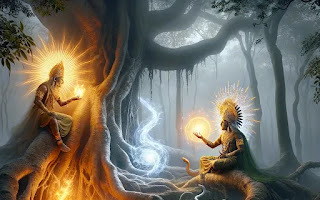
The sun, they say, was originally a man who lived on earth. In the beginning, he gave forth brightness for a space just around his own dwelling. As his shining was confined to a certain space just at and around his own house, the rest of the country seemed as if the sky were very cloudy – as it looks now, in fact, when the sun is behind thick clouds. This shining came from one of the sun’s armpits as he lay with one arm lifted up. When he put down his arm, darkness fell everywhere; when he lifted it up again, it was as if day came. In the the day, the sun’s light used to be white, but at night, it was red like fire. When the sun was thrown up into the sky it became round and never was a man again.
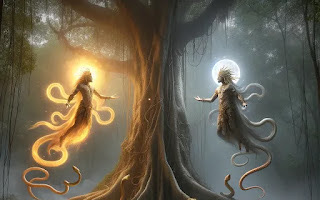
The same is true of the moon. He too, was once a man who could talk. But today neither the sun nor the moon talk. They just live in the sky. Then Spider said, “I shall go on to Sun’s village in order to bring him. ” Hut Moon said, “Let me first get you something to eat.” And Spider replied, “Ho!” So Moon masked up some yam for him to eat. Then Spider set out for Sun’s village. When he reached Sun’s village, he said to him, “Your father says you must come along with me.” And Sun said, “It is well, I and you shall go, but let me get you something to eat first.” Spider replied, “Ho!” So Sun went and caught a sheep. When he came back, he said to Spider, “I would have wished, had my father come here, that he should have seen what I was doing; if it were good, or if it were bad, in either case he would have seen. Since, however, he has not come and you have come, it is as if father had come. Therefore here is this, my sheep, that I shall kill so you may eat.”
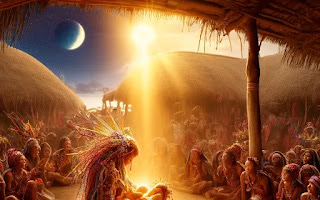
And he killed the sheep and prepared it beautifully for Spider to eat. After the meal Spider said, “Let us go on a fallen tree.” When they got there, Spider said to Sun, “Your father has blackened a stool at his home. He wishes you to succeed to that stool, so he has pulled up a yam and if you know its name, he will take the stool and give it to you. Now this yam is called ‘Terminus.’ And in order that you may not forget its name, I shall cut a shirt drum for you, and make a mpintini drum to go with it, so that when they beat the short drum and the mpintini drum then you will never forget this word, for the shirt drum will speak out and say:
‘Firi bomo!
Firi bomo!”
Then the mpintini drum will say:
‘Kintini bomo!
Kintini bomo!”
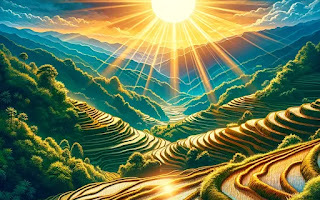
So they set off to go to the sky-god’s town. First they reached Moon’s village and took him along; then they reached Night’s village and took him along. All the way they played the mpintini drum. When they reached the outskirts of the town Spider saw a man, and he sent him off to tell the sky-god that they were coming. There upon the sky-god called on assembly together, and soon Spider and the others arrived and saluted every one. Spider now gave the spokesman the news, saying, “The chief’s errand on which I was sent I have performed; I have brought them.” And the sky-god said, “My children, the reason I caused you to be sent for this: I have blackened the stool standing there and I have also pulled up the yam over there. I shall now take this stool and give it to him who sees and names the yam. Because my eldest child is Night, let him try first.” Then Night said, “It is called ‘Pona.” And all the people shouted, “Y-e-e-e.” Again the sky-god spoke, “My second child is Moon, therefore let him give its name.” And moon said, “It is the yam called ‘Asnate.’ ” The people shouted, “Y-e-e-e-e.” Again the sky-god spoke, “My child, the third one, is Sun, therefore let him name it.”
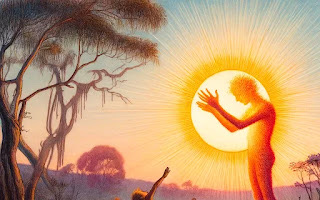
Now’ I forgot to say that the dance music was going on:
“Kintnkyi Bomo!
Kintinkyi bomo!”
and Spider was turning cart-wheels.
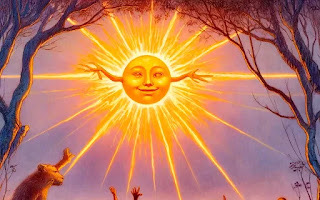
Then Sun rose up and stood there, and took hold of the yam, and he said, “Oh, as for this, since ever I began to walk beside my father and was very small, he used to tell me its name, and I have not forgotten; it is called ‘Terminus” And the tribe shouted three times, “E!E!E!”
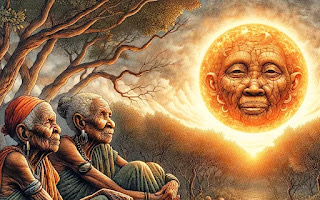
Then his father rose up and stood there and said, “You, Night, you are the eldest, but the words which I told you you have allowed yourself to forget, because you did not pay attention to my words. Because of this, it it now decreed that wicked things only will be done during your time. And you, Moon, the words with which you and I walked and I told you, you too did not follow. It is decreed therefore that only children will play during your reign. As for you, Sun, when I said words to you, you did not forget; you listened to my advice, so you are to be the chief. Should any one have any matter to settle, let it be heard in your time. Household cases. however, may be heard in the evening.
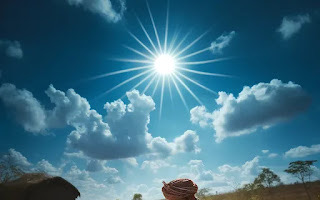
“So take the path which I have set you and if Zeno wishes to trespass upon it, may Diawerigne, the circular rainbow seen at times around the sun, throw itself around you, so that Moon may not be able to come and touch you. Again, if the rainclouds gather, the sky-god’s bow will be cast on the sky that your children who are under you may see when I have cast it so that the waters will not overflow and carry them away.
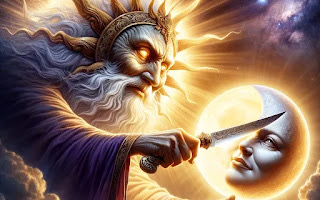
“One more thing. These words which were formerly known as the “Sayings of the Sky-God.” now since the spider, has been able to read these words in my head, let them be known henceforth as “The Sayings of Spider.”
[ ASHANTI ]
